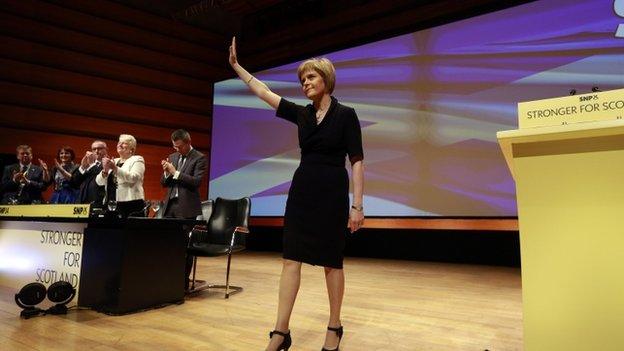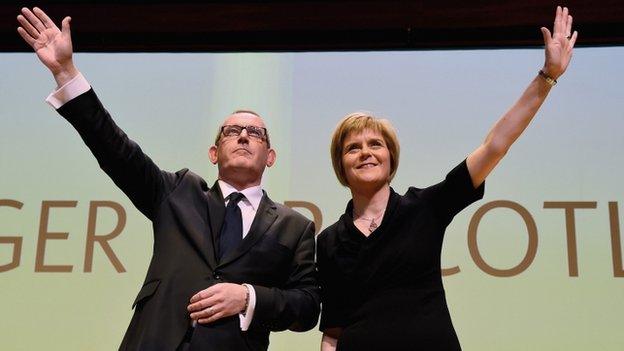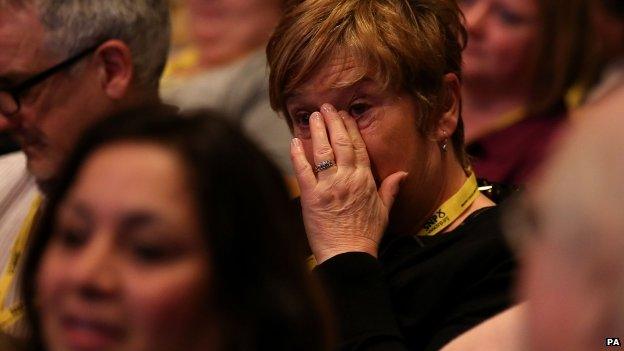SNP conference: Nicola Sturgeon appointed party leader
- Published
- comments
Nicola Sturgeon says being elected as leader of the SNP is ""the biggest privilege of my life"
Nicola Sturgeon has taken over the leadership of the SNP from Alex Salmond, pledging to continue the fight for Scottish independence.
At the SNP conference she also set a target for her party to win the 2015 UK election for Scotland.
Ms Sturgeon, who will become Scottish first minister next week, said the SNP was a party with "the wind in its sails" but there was still much to do.
Meanwhile, MP Stewart Hosie succeeded Ms Sturgeon deputy SNP leader.
Mr Hosie beat the perceived frontrunner for the role, Transport Minister Keith Brown, in a contest also featuring Youth Employment Secretary Angela Constance.
Ms Sturgeon told the conference in Perth that leading the party she joined as a teenager was "the biggest privilege of my life".
Despite the vote against independence in September's referendum, which promoted Mr Salmond to stand down, she told delegates: "I believe today as strongly as I ever have, perhaps more strongly than I ever have, that we will be independent."

Nicola Sturgeon accepted the role of SNP leader at the start of the party's conference in Perth

Stewart Hosie and Nicola Sturgeon were confirmed in their posts at the SNP conference

An emotional Joan Sturgeon, Nicola Sturgeon's mother, was at the SNP conference
"But that will only happen when a majority of our citizens vote for that in a referendum.
"So our task remains as it has always been - not to impose our will, not to berate those who disagree with us but to persuade - respectfully and intelligently through the strength of our arguments and the power of our actions - to persuade the majority of our fellow Scots that the best future for our country, the way to build a more prosperous more successful country and a fairer society, is for us to become a normal independent nation."
Ahead of the UK election, Ms Sturgeon added: "I want this party to leave this conference this weekend with the intention of winning the Westminster election for Scotland next May.
"I want strong SNP MPs at Westminster and I want that for one reason and one reason only - when the SNP is strong, Scotland is strong. Our voice will be heard, our interests will be protected."
Ms Sturgeon said such a result would leave "no hiding place" for the UK parties who pledged to deliver more Scottish Parliament powers in the event of a referendum "No" vote.
Looking forward
Ms Sturgeon also promised to govern Scotland with "competence, energy, commitment, imagination and vision".
She said the SNP was now Scotland's biggest party "by a country mile", adding: "The wind is in our sails, but in politics there is no room for complacency or for self congratulation.
"We must always look forward as a party, as a movement, as a country and ensure we do our best for the people we serve."
Ms Sturgeon also paid tribute to Mr Salmond - who will address the conference later - saying: "We owe him the most enormous debt of gratitude. Lets us thank him from the bottom of our hearts."
Later the party is expected to announce changes to rules allowing non-members to stand as candidates in the general election.
The move is designed to appeal to activists who campaigned for a "Yes" vote in the independence referendum.

ANALYSIS
By Andrew Black, BBC Scotland political reporter
Judging by the mood at the SNP conference, you'd be forgiven for thinking the party actually won September's independence referendum.
Despite September's "No" vote, the nationalists say they have the wind in their sails, while arguing their main opponents - the currently leaderless Scottish Labour Party - is losing support.
As supporters gathered in Perth, Nicola Sturgeon officially succeeded Alex Salmond as the SNP's new leader, marking the end of her 10-year apprenticeship as his deputy.
She stood unopposed for the job - but then again, there was little chance it would have gone to anyone else.
The MSP - who will next week be voted in by parliament as Scotland's fifth first minister - immediately set out her vision for party and power in the post-Salmond era.
Her three top priorities: govern well, win as many seats as possible in next May's UK election and continue the fight for independence.
At the same time, Ms Sturgeon will be occupied with securing maximum new powers for Scotland's devolved government - as promised by the UK parties in return for voters rejecting independence.
She'll do that alongside the SNP's new deputy leader, Stewart Hosie.
The MP was not seen as the frontrunner - Scottish minister Keith Brown won significant backing among his parliamentary colleagues for the job - but Mr Hosie's vision of a Holyrood/Westminster leadership seems to have gone down well with the newly expanded party membership who voted in the contest.
But as well as looking forward, there will also be an opportunity to bid farewell to Alex Salmond as their leader.
Yes, the September referendum didn't go his way, but he has brought enormous success to the SNP which his successor wants to maintain and increase.
As he continues to mull over standing for a Westminster seat next May, it seems we definitely haven't seen the last of Mr Salmond.
One thing's for sure - Ms Sturgeon insists there will be no backseat driving from her soon-to-be former boss.
As she puts it herself: "I'll be in charge, and I don't think he's in any doubt about that."

Mr Salmond will later reaffirm his belief that Scotland will become an independent nation, and set the SNP a target of bringing its membership to 100,000 before next May's general election.
SNP chiefs have said that, despite the outcome of the independence referendum, the party was well placed for further electoral success, with its membership going from 25,000 to more than 84,000 since 18 September.
And they said polls indicated the party was at about 46% on Westminster voting intentions, with the figure at 48% for the Scottish Parliament.
Mr Salmond, who has been Scottish first minister for seven-and-a-half years, will address the conference on Friday afternoon, with Ms Sturgeon making her first speech as party leader 24 hours later.
The outgoing first minister will describe the day of the referendum as the "most significant breakthrough in Scottish political history".
He will add: "Why? Because despite everything that the Westminster establishment threw at Scotland, 45% of the people - 1.6 million women and men living and working in Scotland - chose hope over fear, a much higher number than our opponents ever thought possible when we started this campaign."
Mr Salmond is expected to say: "After the referendum, those very opponents believed that Scotland had been quietened, that we'd had our day in the sun and we should be politely put back in our box.
"They thought it was all over… well it isn't now. Because in truth, delegates, everything in Scotland is now different. All has changed and changed utterly.
"Because of the 55% who voted 'No', many did so on the last minute promise of radical constitutional reform within the Union."